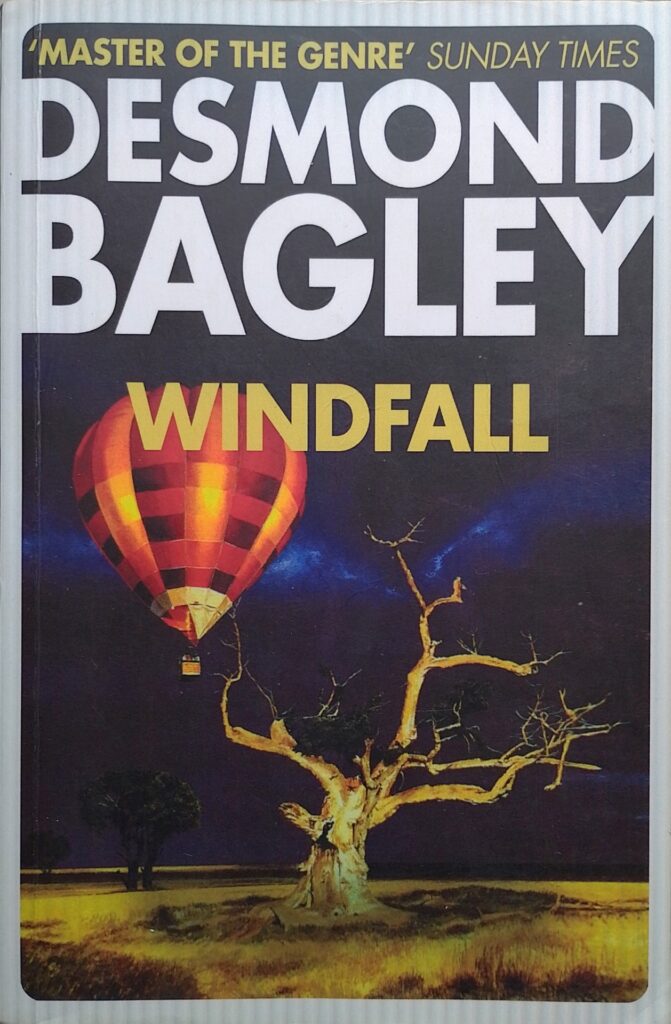First published 1981. Harper Collins paperback, 2017, pp 347, c. 112,000 words.
This was the last of Bagley’s books published in his lifetime, although three more have been published under his name since. There is a degree of maturity in the complexity of the plot, but it falls off towards the end as the point of view suddenly swings around to reveal what is really going on. Perhaps Bagley felt that the story wasn’t getting to a resolution fast enough using the structure he had started with, and he felt the need to rush the ending.
This is a conventional thriller of the period. The protagonist is Max Stafford, a former soldier now running his own successful security consultancy. He is considering expanding his business beyond Europe either into Africa or North America, and lunches with an old friend who has recently married a South African. The action then switches to the United States where Ben Hardin, a former CIA operative, who now works for another security company, is asked by his boss to track someone down for a client in connection with a valuable will. The link between the strands of the story emerges as Africa where the will writer’s fortune was made. The major legacy has been left to an obscure Kenyan agricultural research institution.
This is a world in transition. There are echoes of the second world war in that Stafford has a personal assistant, effectively a batman, who prefers to retain old military titles. Women are all support players: a femme fatale, a secretary and a scientist. Only the latter gets to see any action and that is because she pushes her way in rather than being invited. It is a world of the present (at the time of writing) in that the apartheid regime of South Africa is the pariah. It is also the world of the future with two rather mysterious Kenyan’s helping Stafford, one is an ethic African, the other Sikh. Both are intelligent, capable and in control. Bagley had lived in South Africa for many years and, on this showing, has less admiration and sympathy for the white Africans than for all the other races living there. He is also able to effectively describe the landscape and experience of travelling in Kenya which he must have known well too.
The plot is complex and the cast of characters long. In the first seven pages we are introduced to seven significant characters and the list grows through the book. Many remain two-dimensional, but a number form into real people. The will, while being a conventional plot device, provides fertile ground for mystery which is cleverly explored as the two major characters uncover elements that eventually converge. Just over half way through, the suspense is undone as the point of view switches to what had been one of the secondary characters; the reader is suddenly given privileged insight into what is going on. Bagley’s ambition seems to have deserted him at this point: the book switching from mystery to thriller. Several ends are left loose; notably the term of the will requiring the heirs of the estate to work in the Kenyan college. Indeed the whole division of part of the estate amongst the heirs doesn’t seem to fit with the plot’s resolution.
Bagley’s writing here doesn’t stand up well to close scrutiny. There are plenty of examples of clunky phrasing and sentence structure, e.g. after one character has done a favour we are told ‘He was a good friend to Hardin.’ [p47] A little later we are told ‘…Hardin bough a street plan of London from a news vendor because, although he was no stranger to London, it was many years since he had been there.’ [p50], and ‘the grounds were kept in good condition with mown lawns, and flowering trees were everywhere, bougainvillea and jacaranda.’ [p111], ‘It could not be to see animals’ [p121], ‘and changing into street clothes in the changing room.’ [p232].
Just occasionally Bagley hits the spot: ‘Adventure is discomfort recollected in tranquillity.’ [p168] This is now attributed to an American travel writer named Tim Cahill, whose first book was not published until 1986, five years after this.
So to enjoy this book, put aside your inner critic and enjoy the pacy and convoluted ride.
Wikipedia biography of Bagley: https://en.wikipedia.org/wiki/Desmond_Bagley
Wikipedia summary of the book: https://en.wikipedia.org/wiki/Windfall_(novel)
Others’ reviews of the book: https://www.goodreads.com/book/show/1218908.Windfall?ac=1&from_search=true&qid=h9UgFyySjR&rank=1
© William John Graham, December 2023

